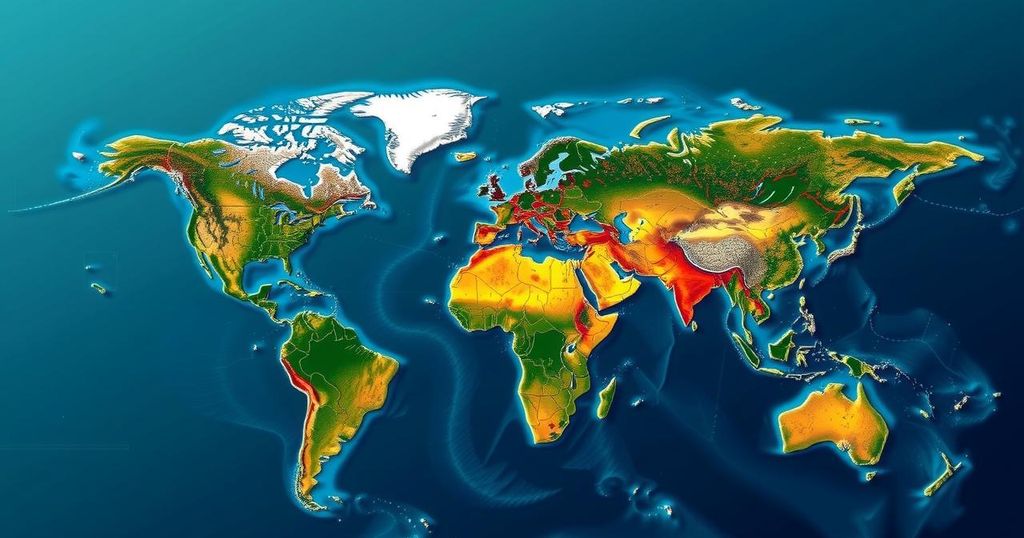Climate Migration Escalates as Global Warming Displaces Millions

Climate migration is sharply increasing due to climate change, uprooting millions from their homes. Ugochi Daniels from IOM noted that 26 million people were displaced last year alone. As the crisis escalates, it is projected that 216 million people will be displaced by 2050, half of whom will be in Africa. Solutions discussed at the Baku talks include planned relocation and greater access to climate finance for vulnerable communities, emphasizing the need for prompt action to manage climate-induced migration.
Migration due to climate change is escalating rapidly as global temperatures continue to rise, resulting in millions of people being displaced from their homes, particularly in vulnerable nations. Ugochi Daniels, Deputy Director General for Operations at the International Organization for Migration (IOM), highlighted the increasing challenges faced by communities affected by climate-related disasters during the recent Baku climate talks. She indicated that last year alone, nearly 26 million individuals were uprooted due to climate impacts, severely affecting their livelihoods and forcing them to seek opportunities elsewhere. Daniels elaborated on various aspects of climate displacement, including disaster-related migrations and planned relocations supported by IOM. As the urgency of the climate crisis intensifies, the World Bank projects that by 2050, approximately 216 million people will be displaced within their own countries due to climate change. This movement is often influenced by multiple factors, such as extreme weather events coupled with a lack of necessary investments to bolster community resilience. The integration of migration into climate adaptation strategies is crucial, as emphasized at the Baku meetings. Approximately half of the projected 216 million displaced individuals will be from Africa, highlighting the continent’s vulnerability amidst pervasive developmental challenges. With water stress anticipated to impact 700 million Africans by 2030, the realities of climate-induced migrations, as witnessed in Nigeria and other regions, are becoming increasingly untenable. IOM’s commitment to increasing visibility and awareness on the relationship between climate change and human migration has garnered support from over 40 African nations through initiatives like the Kampala Declaration on Migration, Environment, and Climate Change. As dialogue progresses, it is essential for member states to recognize and prioritize vulnerable communities within climate financing frameworks, considering migration as a viable coping strategy for adaptation. Furthermore, Daniels addressed the importance of remittances, which contribute significant financial support to developing economies and assist communities in coping with climate-related challenges. Improved access to climate finance and effective operationalization of the Loss and Damage Fund are imperative in fostering regional cooperation for managing climate-induced migrations. Facilitating the engagement of those most affected in decision-making processes will ensure that their needs are adequately addressed.
The growing issue of climate migration is a pressing global concern driven by the escalating impacts of climate change. Individuals in vulnerable regions are increasingly uprooted from their homes due to extreme weather events, including floods, droughts, and rising temperatures, exacerbated by poor infrastructure and investment in community resilience. The discussions at international forums such as COP (Conference of the Parties) are crucial for developing actionable strategies to address the intersection of climate change and migration. The International Organization for Migration is actively involved in facilitating these discussions and advocating for the inclusion of human mobility in climate adaptation efforts, as millions face displacement by 2050.
In conclusion, the migration crisis rooted in climate change represents one of the most pressing challenges of our time. As millions of individuals are displaced and global temperatures continue to rise, concerted efforts must be made to integrate migration into climate strategies, enhance community resilience, and ensure that vulnerable populations are prioritized in climate financing initiatives. By doing so, the international community can better manage the impacts of climate change on human mobility and safeguard the livelihoods of those most at risk.
Original Source: www.ipsnews.net






